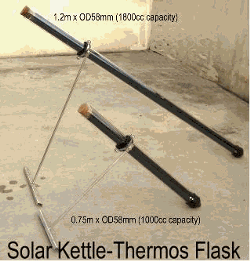
Problem being addressed[edit | edit source]
The United Nations Children's Fund (UNICEF) estimates that 60% of rural families and 23% of urban families in developing countries do not have access to safe water. In some areas, all water supplies are contaminated by microbes. Water is seldom boiled due to the time and fuel required. UNICEF indicates that diarrhea is the most common childhood disease in the developing world. Diarrhea-related dehydration is the leading cause of death in children under the age of five and annually, an estimated five million children die from it.
Detailed description of the solution[edit | edit source]
The Solar Kettle-Thermos Flask has a glass core and its sensitive coatings are protected in a vacuum chamber reinforced by a barium ring. To use the Solar Kettle-Thermos flask, one fills it with water, corks it and places it in the sun, where it can be left unattended. When the water in the flask starts to give off steam, the heated water can be used for drinking. The kettle may also be used as a thermos, which keeps hot water hot, even in low temperature conditions. A simple pasteurized water temperature indicator may be incorporated to ensure sufficient pasteurization, such as the WAPI (Water Pasteurization Indicator), which is available at low cost.
Designed by[edit | edit source]
- Designed by: Alex Kee Koo Yak
- Manufacturer: AkayConsult Enterprises
- Manufacturer location: Century Garden, Johor Bahru, Malaysia
When and where it was tested/implemented[edit | edit source]
Testing for this device has been conducted in Malaysia and New Zealand.
Funding Source[edit | edit source]
AkayConsult Enterprises funds this project.
References[edit | edit source]
Internally generated reports[edit | edit source]
Koo Yak, A. K. (2004). The Solar Kettle-Thermos Flask: A Cost Effective, Sustainable & Renewable Water Pasteurization System for the Developing World. PDF available here.
Externally generated reports[edit | edit source]
Kee, A. (2006). Solar kettle-thermos flask. Link available here.